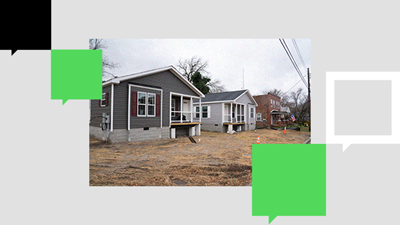Overview
Communities throughout the country share common needs: affordable connections to broadband Internet, modern and reliable energy infrastructure, effective responses to mental health challenges, and ways to resolve legal disputes more quickly and fairly. To address these issues, Pew collaborates with states and local governments to find and promote evidence-based solutions that help provide stability and opportunity.
We also have a long-standing commitment to Philadelphia, our hometown. For more than 75 years, we’ve tracked and helped address the city’s challenges, from job creation to health care.

Over the past half century, Ken Burns has become America’s storyteller. His documentaries provide a history of the nation through biographies, sports, music, and other subjects. His most recent film, “The American Revolution,” which was supported by The Pew Charitable Trusts, premiered in November on PBS. He spoke about it with Pew recently in his barn office in New Hampshire.
Trust Magazine

According to a recent report, electricity use could jump 25% by 2030, driven in part by energy-hungry AI data centers. This surging demand, combined with increasingly extreme weather, puts our power supply at risk.

Two hundred and fifty years later, the American Revolution is as relevant as ever. The values and the ideas discussed, debated, argued over, and ultimately written down in the Declaration of Independence and U.S. Constitution as 13 North American colonies broke from British rule in the 18th century remain essential to how we think about government today. Five prominent historians and filmmakers reflected on the war’s epic impact in a wide-ranging conversation at the National Constitution Center in Philadelphia in September that then aired as a national PBS special supported by The Pew Charitable Trusts in November.
Trust Magazine

As artificial intelligence grows in popularity, new data centers must accommodate the systems’ enormous need for energy. At the same time, household energy usage is rising throughout the United States. These increasing demands for electricity are stressing our nation’s aging electric grid.

Philadelphia, often referred to as the poorest large U.S. city, has seen a steady decline in the poverty rate in the last decade. In 2013, 27% of residents lived in poverty—that rate declined to 22% in 2023. Despite this citywide decrease, the poverty rate among Philadelphians who identify as Latino remains the highest among the city’s racial and ethnic groups—a trend that’s held for over a decade.
Our Work

Good health is important to everyone. Pew conducts research and provides information and fact-based recommendations to state agencies, hospitals, researchers, and other health partners to help them provide better care. We find and share evidence-based practices to improve Americans’ health and well-being, including services that can prevent suicide, improve mental health care, and treat substance use disorder.
Latest In Advance Health & Well-Being

Communities throughout the country share common needs: affordable connections to broadband Internet, modern and reliable energy infrastructure, effective responses to mental health challenges, and ways to resolve legal disputes more quickly and fairly. To address these issues, Pew collaborates with states and local governments to find and promote evidence-based solutions that help provide stability and opportunity.

Nonpartisan, fact-based improvements in federal policy can create jobs, lower costs, and help the nation prepare for the future. When our research shows that small changes can have a big impact, we work across party lines to improve national challenges like housing affordability, internet access, energy reliability, and health care.
Latest In Improve Federal Policy
/16x9_m.jpg?mw=352&hash=5394D3C3222DC77A0FAB569584F50D98)
Economic opportunity is the foundation of American society. Pew supports national, state, and local efforts to expand opportunity and promote financial well-being. Our work helps people pay off student loans, navigate court proceedings such as debt collection, buy or rent a home, access affordable internet, and save for their retirement.
Latest In Improve Economic Advancement

The global ocean teems with life, and it contributes to the vital cycles that keep people and our planet healthy. But the seas are vulnerable to overfishing, loss of habitat such as seagrasses and mangroves, ineffective fisheries management, plastic pollution, and declining biodiversity. These mounting losses affect the coastal communities that depend on the ocean for food and jobs.
Latest In Protect Marine Life

States and cities are the “laboratories of democracy” in America—the places where lawmakers and governors look for new ways to help their communities succeed. Whether in Pew’s hometown of Philadelphia or any of the 50 state capitals, we help elected leaders respond to the needs of their citizens, use public dollars wisely, fix outdated policies, and build a better future for all.
Latest In Strengthen State Government

Conserving natural spaces conveys benefits far beyond the gains to wildlife and their habitats. As scores of studies show, protecting and restoring lands and waters, particularly when done in close partnership with local communities, also improves people’s lives—and local economies—by increasing tourism and outdoor recreation.
